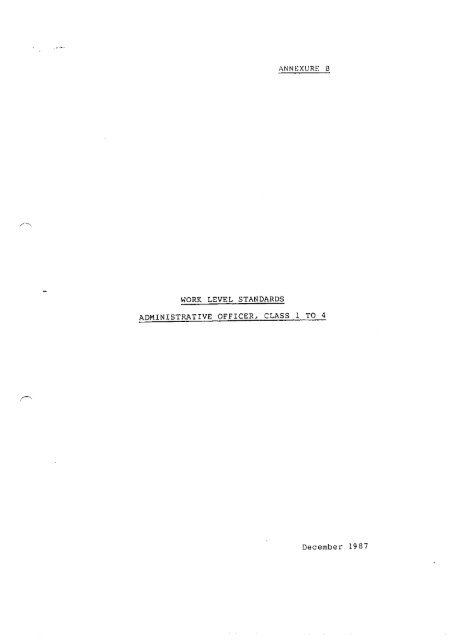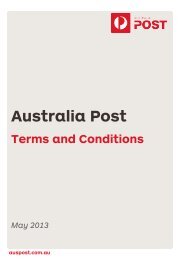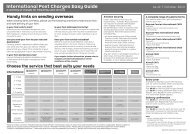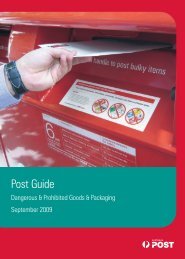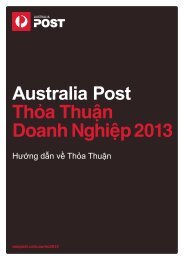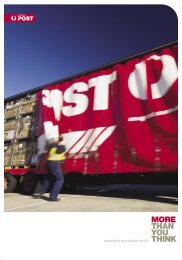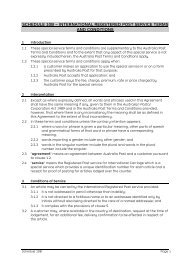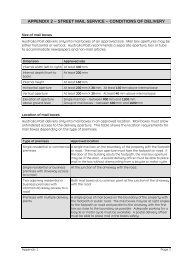Work Level Standards Part B - Australia Post
Work Level Standards Part B - Australia Post
Work Level Standards Part B - Australia Post
Create successful ePaper yourself
Turn your PDF publications into a flip-book with our unique Google optimized e-Paper software.
NATIONAL CLASSIFICATIONS STANDARDS<br />
FOR THE POSTAL TECHNICAL STREAMS<br />
PURPOSE<br />
The prime purpose of the Classification <strong>Standards</strong> is to provide a national<br />
framework for the classification of positions within the <strong>Post</strong>al Technical Streams,<br />
including associated qualification requirements. More detailed position profiles<br />
and duty statements may be applied at the local level.<br />
The Classification <strong>Standards</strong> are indicative only and are not intended to be<br />
exhaustive or all encompassing. Position roles, responsibilities and work duties<br />
may change or evolve over time as business needs and requirements change.<br />
Recognising the dynamic nature of the postal business, the Classification<br />
<strong>Standards</strong> will be reviewed every 5 years (or earlier, as business requirements<br />
change) to ensure they remain relevant and up-to-date.<br />
The Classification <strong>Standards</strong> replace existing <strong>Work</strong> <strong>Level</strong> <strong>Standards</strong> for the<br />
<strong>Post</strong>al Trades / Technical Officer Structure.<br />
SCOPE<br />
The Classification <strong>Standards</strong> incorporate all trades and technician based<br />
technical maintenance functions associated with:<br />
The installation, commissioning, testing, modification, maintenance,<br />
performance monitoring and repair of Mail Processing Equipment (MPE)<br />
including letter and parcel processing equipment and associated plant;<br />
Stores and inventory management (excluding those positions classified in the<br />
Administrative Officer structure);<br />
Engineering workshops;<br />
Technical training;<br />
Technical support and project services.<br />
The technical qualifications referred to in this document are included in the<br />
<strong>Australia</strong> <strong>Post</strong> Technical Competency Development Framework. Electrical<br />
licence and other licensing requirements vary from State to State, and may be<br />
required in addition to technical qualification requirements.<br />
TECHNICAL TEAM LEADER CLASSIFICATIONS<br />
In accordance with previous agreements established under EBA4 and EBA5,<br />
Technical Team Leaders are classified as <strong>Post</strong>al Technical Officer <strong>Level</strong> 6 at the<br />
following facilities:<br />
- Sydney West Letters Facility<br />
- Sydney East Letters Facility<br />
- Sydney Parcels Facility<br />
- Dandenong Letters Centre<br />
Version 1.1 September 2010 1
National Classifications <strong>Standards</strong> for the <strong>Post</strong>al Technical Streams<br />
- Melbourne Parcel Facility<br />
- Underwood Mail Centre<br />
- Northgate Mail Centre<br />
- Perth Mail Centre<br />
- Adelaide Mail Centre<br />
Technical Team Leaders in all other facilities are classified at <strong>Post</strong>al Technical<br />
Officer <strong>Level</strong> 5.<br />
ROLE AND RESPONSIBILITIES<br />
At its broadest level, the role and vision of the Technical / Trades Group is to<br />
improve overall equipment effectiveness at the lowest sustainable cost through:<br />
Improved equipment reliability;<br />
Execution of maintenance work;<br />
Maintenance support and development, including effective management of<br />
spare parts and materials.<br />
The specific role and responsibilities outlined for each level in the Classification<br />
<strong>Standards</strong> are aimed at supporting and facilitating achievement of the above role<br />
and vision.<br />
Consistent with the <strong>Australia</strong> <strong>Post</strong> Technical Competency Development<br />
Framework and principles of a High Performance Organisation, the Classification<br />
<strong>Standards</strong> are built on a progression of responsibilities and qualifications<br />
consistent with the role, function and qualifications required at each level.<br />
Depending on specific facility, functional and State licensing requirements,<br />
people occupying positions classified at a higher level should generally be<br />
capable of performing, and may be required to perform, responsibilities and work<br />
duties undertaken by other team members, including hands-on technical<br />
maintenance work.<br />
Recognising the dynamic and changing nature of the postal business, work<br />
responsibilities may also be added or changed at each level over time to reflect<br />
current and future business and operational needs and requirements.<br />
In particular, as employees’ gain more experience with new processing<br />
technologies and as best practice maintenance tools, methodologies and<br />
techniques are progressively introduced, there is scope for technical staff, after<br />
receiving appropriate training to take on a greater leadership role in areas such<br />
as:<br />
- Condition based monitoring;<br />
- Diagnostic, predictive and pro-active maintenance;<br />
- Reliability and Failure Modes and Effects Analysis (FMEA) of MPE;<br />
- Performance monitoring and process improvement;<br />
Version 1.1 October 2004 2
National Classifications <strong>Standards</strong> for the <strong>Post</strong>al Technical Streams<br />
- The coaching and mentoring of operational staff to demonstrate how to<br />
achieve improved machine optimisation.<br />
TERMS USED<br />
Unless otherwise specified, terms used in the Classification <strong>Standards</strong> have the<br />
following meaning:<br />
<strong>Australia</strong> <strong>Post</strong> policies and procedures include, but are not limited to:<br />
- National maintenance policies and procedures<br />
- Equipment Support Plans<br />
- Technical Maintenance Plans<br />
- Technical bulletins<br />
- Safe Operating Procedures<br />
- Original Equipment Manufacturing (OEM) Specifications<br />
<strong>Australia</strong> <strong>Post</strong> Technical Competency Development Framework (APTCDF) refers<br />
to the competency framework and standards endorsed by the Technical<br />
Competency Development Joint <strong>Work</strong>ing <strong>Part</strong>y, comprising representatives from<br />
<strong>Australia</strong> <strong>Post</strong>, CEPU and an Electrotechnology Registered Training Organisation<br />
(RTO). The APTCDF was endorsed by the M&ND Mails Executive Committee in<br />
March 2003.<br />
<strong>Australia</strong> <strong>Post</strong> Induction Competencies is equivalent to completing the Certificate<br />
I in Business and comprises the following seven units of competency:<br />
- BSBCMN101A Prepare for <strong>Work</strong><br />
- BSBCMN102A Complete Daily <strong>Work</strong> Activities<br />
- BSBCMN103A Apply Basic Communication Skills<br />
- BSBCMN104A Plan Skills Development<br />
- BSBCMN106A Follow <strong>Work</strong>place Safety Procedures<br />
- BSBCMN109A Follow Environmental <strong>Work</strong> Practices<br />
- TDTD197B Shift Materials Safely Using Manual Methods<br />
<strong>Australia</strong> <strong>Post</strong> Technical Core Competencies is equivalent to completing 50% of<br />
the Certificate II in Business and comprises the following seven units of<br />
competency:<br />
- BSBCMN105A Use Business Equipment<br />
- BSBCMN205A Use Business Technology<br />
- BSBCMN107A Operate a Personal Computer<br />
- BSBCMN108A Develop Keyboard Skills<br />
- BSBCMN206A Process and Maintain <strong>Work</strong>place Information<br />
- BSBCMN213A Produce Simple Word Processed Documents<br />
- BSBCMN214A Create and Use Simple Spreadsheets<br />
Competency assessment process involves a work-based assessment of<br />
competency against prescribed units of competency and is undertaken in<br />
Version 1.1 October 2004 3
National Classifications <strong>Standards</strong> for the <strong>Post</strong>al Technical Streams<br />
accordance with the assessment guidelines contained in the relevant Industry<br />
Training Package and the <strong>Australia</strong> <strong>Post</strong> Competency Framework Assessment<br />
Policy. These guidelines ensure the assessment process:<br />
- Is both fair and transparent;<br />
- Is focussed on AP technical workplace requirements;<br />
- Provides primarily for Recognition of Current Competence (RCC) and<br />
Recognition of Prior Learning (RPL);<br />
- Ensures there are no formal tests or pass / fail grading;<br />
- Allows for verification of work-place competence when the individual being<br />
assessed, and their supervisor has provided sufficient evidence to meet<br />
pre-determined work-based criteria;<br />
- Ensures clear appeal procedures are in place; and<br />
- Ensures the award of nationally - recognised certification is achieved.<br />
Management Information Systems (MIS) may include, but are not limited to:<br />
- SAP<br />
- QSM<br />
- QIP<br />
- MailStats<br />
- Balanced Scorecard<br />
- Link One<br />
Maintenance refers to two functions - Maintenance Engineering and Maintenance<br />
Operations.<br />
Maintenance Engineering is the engineering and technical activities conducted in<br />
support of and to coordinate maintenance operations. Based on the principles of<br />
Reliability Centred Maintenance (RCM) and Total Productive Maintenance<br />
(TPM), these activities are the responsibility of the Network Engineering Unit and<br />
include:<br />
- The development of maintenance policy and procedures;<br />
- Defect investigations to determine failure causes and corrective actions;<br />
- Reliability improvement studies and investigations;<br />
- Control and management of MPE modifications (configuration<br />
management);<br />
- Development and review of Equipment Support Plans;<br />
- Provision and review of technical documentation and other data;<br />
- Identification and control of compliance requirements;<br />
- Design and development of test, inspection, calibration, or other<br />
maintenance procedures as required; and<br />
- Provision of high-level specialist support for MPE, eg. Help desk support.<br />
Maintenance Operations are the day-to-day activities associated with the<br />
physical maintenance of MPE and aimed at improving equipment reliability and<br />
availability in accordance with RCM and TPM principles. These activities are the<br />
Version 1.1 October 2004 4
National Classifications <strong>Standards</strong> for the <strong>Post</strong>al Technical Streams<br />
responsibility of the facility Technical Services Manager or equivalent and<br />
include:<br />
- Maintenance planning and control,<br />
- Maintenance resource allocation,<br />
- Coordination of maintenance requirements with operational requirements,<br />
- Maintenance budget control and management,<br />
- Control and management of technical staff engaged in direct maintenance<br />
of plant and equipment,<br />
- Implementation of maintenance contracts,<br />
- Supervision of maintenance contractors, and<br />
- Conduct of maintenance tasks and compliance.<br />
Type of Maintenance: There are three types of MPE Maintenance - Operator<br />
Maintenance, Technical Maintenance and Specialist Maintenance.<br />
Operator Maintenance: is done at the machine and will generally involve:<br />
- Monitoring of systems for correct operation;<br />
- Before-use and after-use tasks (eg cleaning);<br />
- Servicing (replacement of consumables, lubrication, cleaning, etc.);<br />
- Minor repairs and adjustments;<br />
- Operational checks;<br />
- Functional tests; and<br />
- Recording and notification of faults.<br />
Technical Maintenance: may be carried out at the machine or in a repair facility<br />
by technical staff or maintenance contractors and will generally involve:<br />
- Servicing beyond the scope and resources of operators;<br />
- Repairs and adjustments beyond the scope and resources of operators;<br />
- Replacement of Lowest Replaceable Unit or higher level items;<br />
- Modifications;<br />
- Calibration;<br />
- Operational checks;<br />
- Functional tests;<br />
- Repairs to approved items;<br />
- Approved major repairs;<br />
- Minor manufacture;<br />
- Inspection and assessment of MPE condition;<br />
- Non-destructive testing for fault or defect elimination.<br />
Specialist Maintenance: may be carried out by <strong>Australia</strong> <strong>Post</strong> technical staff<br />
and/or specialist contractors and comprises all those repair activities beyond the<br />
scope or resources of Technical Maintenance.<br />
Qualifications: The qualification requirements specified in the Classification<br />
<strong>Standards</strong> reflect current terminology as outlined in the table “Qualification<br />
Equivalents”.<br />
Version 1.1 October 2004 5
National Classifications <strong>Standards</strong> for the <strong>Post</strong>al Technical Streams<br />
Qualification Equivalents<br />
<strong>Australia</strong>n Technical Qualifications<br />
Pre 1990 1990 – 1996 1996 – Current AQF <strong>Level</strong> 1<br />
Diploma Diploma Advanced Diploma 6<br />
Associate<br />
Diploma<br />
Associate Diploma Diploma 5<br />
<strong>Post</strong> Trade Advanced Certificate Certificate IV 4<br />
Trade Trade Certificate III 3<br />
Pre Trade Pre Trade Certificates I & II 1 & 2<br />
1 The <strong>Australia</strong>n Qualifications Framework (AQF) is the policy framework that<br />
provides a nationally consistent recognition of outcomes achieved in postcompulsory<br />
education. The AQF was introduced <strong>Australia</strong>-wide on 1 January<br />
1995 so work-based qualifications and academic qualifications became part of a<br />
single system, allowing maximum flexibility in career planning and continuous<br />
learning. There are thirteen levels within the AQF starting at Certificate 1 through<br />
to Doctoral degree. Registered Training Organisations (RTOs) are accredited to<br />
issue qualifications according to the requirements of the AQF.<br />
Version 1.1 October 2004 6
National Classifications <strong>Standards</strong> for the <strong>Post</strong>al Technical Streams<br />
CLASSIFICATION STANDARD – POSTAL TECHNICAL OFFICER, LEVEL 1<br />
Definition / Indicative Position:<br />
A technical support position in a processing facility or engineering workshop<br />
performing a range of maintenance activities under supervision.<br />
Minimum Qualification Requirements:<br />
Certificate 1 in Business or equivalent (or progression towards completion).<br />
A current driver licence is required where driving duties are undertaken.<br />
Highly Desirable:<br />
Certificate II in Electrotechnology (Technical Support) or equivalent.<br />
Some technical / trades / stores experience.<br />
Role:<br />
To provide support for the technical maintenance function including:<br />
Undertake routine cleaning of mail processing equipment and associated<br />
plant.<br />
Monitor and record maintenance and equipment performance data.<br />
Assist technical staff as directed and under supervision with other<br />
maintenance tasks.<br />
Maintain a safe working environment and comply with <strong>Australia</strong> <strong>Post</strong><br />
Occupational Health and Safety Policies and Diversity Policy.<br />
Record stock / spare parts usage on a daily basis on the National Inventory<br />
Management System, advise supervisory staff of reorder requirements and<br />
initiating reorders as require.<br />
Pick up and deliver goods to and from local external and internal suppliers as<br />
required.<br />
Assist with purchasing and technical stores activities.<br />
Carry out other general stores duties.<br />
Version 1.1 October 2004 7
National Classifications <strong>Standards</strong> for the <strong>Post</strong>al Technical Streams<br />
CLASSIFICATION STANDARD – POSTAL TECHNICAL OFFICER, LEVEL 2<br />
Definition / Indicative Position:<br />
Technical / trades position in a workshop, processing facility or technical store.<br />
Minimum Qualification Requirements:<br />
Certificate III in Electrotechnology (Technical Support) or equivalent, or a<br />
related trade.<br />
Role:<br />
To undertake a range of skilled technical and trades-based tasks and activities in<br />
a team environment. Key responsibilities may include:<br />
Perform construction, installation, maintenance and modifications work in the<br />
trade discipline held, for example carpentry, sheetmetal, signwriting, etc.<br />
Undertake routine maintenance tasks of MPE and associated plant.<br />
Maintain a safe working environment and comply with <strong>Australia</strong> <strong>Post</strong><br />
Occupational Health and Safety Policies and Diversity Policy.<br />
<strong>Work</strong> as required as part of a technical team, where appropriate.<br />
Carry out technical stores and inventory management tasks and activities.<br />
Version 1.1 October 2004 8
National Classifications <strong>Standards</strong> for the <strong>Post</strong>al Technical Streams<br />
CLASSIFICATION STANDARD – POSTAL TECHNICAL OFFICER, LEVEL 3<br />
Definition / Indicative Position:<br />
Technical / trades position in either a workshop or processing facility performing<br />
a supervisory / leadership role.<br />
Minimum Qualification Requirements:<br />
Certificate III in Electrotechnology (Systems Electrician) or equivalent, or a<br />
related trade,<br />
Highly Desirable:<br />
Certificate IV in Electrotechnology (Systems Electrician) or equivalent (or<br />
progression towards completion)<br />
Certificate III in Business (Frontline Management) or equivalent (or<br />
progression towards completion)<br />
Successful completion of all <strong>Australia</strong> <strong>Post</strong> technical core competencies.<br />
Note: Electrical licence and other licensing requirements vary from State to State,<br />
and may be required in addition to the above technical qualification requirements.<br />
Role:<br />
To undertake and supervise a range of skilled technical and trades-based tasks<br />
and activities in a team environment. Key responsibilities may include:<br />
Supervise the work of other technical / trades staff members.<br />
Undertake tasks associated with electrical and mechanical fitting, carpentry,<br />
sign writing and other trade based skills.<br />
<strong>Work</strong> as part of a team with operations and other service groups to achieve<br />
high levels of machine availability.<br />
<strong>Part</strong>icipate in performance monitoring and continuous improvement activities.<br />
Assist in commissioning letter or parcel processing equipment and associated<br />
equipment.<br />
<strong>Work</strong> with other individuals and groups on allocated tasks and fault escalation<br />
processes to ensure end to end resolution of any equipment or system fault.<br />
Record maintenance and inventory data records in an accurate and timely<br />
manner using electronic and/or manual recording methods as required.<br />
Comply with maintenance standards and operational standards.<br />
Maintain a safe working environment and comply with <strong>Australia</strong> <strong>Post</strong><br />
Occupational Health and Safety Policies and Diversity Policy.<br />
Version 1.1 October 2004 9
National Classifications <strong>Standards</strong> for the <strong>Post</strong>al Technical Streams<br />
CLASSIFICATION STANDARD – POSTAL TECHNICAL OFFICER, LEVEL 4<br />
Definition / Indicative Position:<br />
Technical position in a processing facility performing normal maintenance<br />
activities or a Technical Stores Controller.<br />
Minimum Qualification Requirements:<br />
Certificate III in Electrotechnology (Systems Electrician) or equivalent 2 .<br />
Highly Desirable:<br />
Certificate IV of Electrotechnology (Systems Electrician) or equivalent (or<br />
progression towards completion)<br />
Certificate IV in Business (Frontline Management) or equivalent (or<br />
progression towards completion)<br />
Note: Electrical licence and other licensing requirements vary from State to State,<br />
and may be required in addition to the above technical qualification requirements.<br />
Role:<br />
To assist the achievement of mail service and production standards through<br />
application of Reliability Centred Maintenance (RCM) and Total Productive<br />
Maintenance (TPM) principles. Operating in a team environment, they fulfil this<br />
role by conducting maintenance and related activities in accordance with national<br />
maintenance policies and procedures.<br />
Employees may, subject to the limits of individual competence, be required to<br />
perform any of the functions and duties falling within this broad-banded<br />
classification level including:<br />
Individual / Team Leadership<br />
Develop a team-based approach between technical and operational staff.<br />
Ensure that an effective working relationship is maintained with mail<br />
processing staff and maintenance service providers.<br />
Provide information, advice and on-the-job training to mail processing and<br />
other technical staff.<br />
Assist Technical Team Leaders in planning assigned maintenance and repair<br />
work.<br />
Technical Maintenance<br />
<strong>Work</strong> as part of a team with operations and other service groups to achieve<br />
high levels of machine uptime, performance and cost effectiveness.<br />
Implement reliability improvement plans.<br />
<strong>Part</strong>icipate in performance monitoring and continuous improvement activities.<br />
2 Does not cover any salary advancement qualification matters – refer to Translation<br />
Guidelines for <strong>Post</strong>al Technical Streams, February 2004<br />
Version 1.1 October 2004 10
National Classifications <strong>Standards</strong> for the <strong>Post</strong>al Technical Streams<br />
Assist in commissioning letter or parcel processing equipment and associated<br />
equipment.<br />
Carry out maintenance activities in accordance with approved national<br />
maintenance policies and procedures.<br />
<strong>Work</strong> with other individuals and groups on allocated tasks and fault escalation<br />
processes to ensure end to end resolution of any equipment or system fault.<br />
Record maintenance and inventory data records in an accurate and timely<br />
manner using electronic and/or manual recording methods as required.<br />
Regularly monitor, analyse and evaluate equipment performance and<br />
implement corrective action where necessary.<br />
Comply with maintenance standards and operational standards.<br />
Maintain a safe working environment and ensure compliance with <strong>Australia</strong><br />
<strong>Post</strong> Occupational Health and Safety Policies and Diversity Policy.<br />
Stores and Inventory Management<br />
Support the management of all aspects of the technical stores function.<br />
Version 1.1 October 2004 11
National Classifications <strong>Standards</strong> for the <strong>Post</strong>al Technical Streams<br />
CLASSIFICATION STANDARD – POSTAL TECHNICAL OFFICER, LEVEL 5<br />
Definition / Indicative Position:<br />
Technical Team Leader in a processing facility other than those specifically<br />
listed 3 or a Technical Supervisor in charge of the technical stores and/or<br />
reporting functions or a Technician providing project support.<br />
Minimum Qualification Requirements:<br />
Certificate IV in Electrotechnology (Systems Electrician) or equivalent<br />
Certificate IV in Business (Frontline Management) or equivalent (or<br />
progression toward completion)<br />
Highly Desirable:<br />
Diploma of Electrical Engineering or equivalent (or progression toward<br />
completion) 4<br />
Note: Electrical licence and other licensing requirements vary from State to State,<br />
and may be required in addition to the above technical qualification requirements.<br />
Role:<br />
To lead and manage a team of technical staff, or manage the technical stores<br />
and/or reporting functions. Operating in a team environment, they fulfil this role<br />
by performing a range of leadership and supervisory roles in addition to<br />
conducting maintenance and related activities. Other roles performed at this<br />
level may include support of technical project activities.<br />
In addition to the responsibilities of a <strong>Post</strong>al Technical Officer <strong>Level</strong> 4, Technical<br />
Team Leader responsibilities may also include:<br />
Individual / Team Leadership<br />
Lead, manage and facilitate a team of technical staff.<br />
Coach, mentor and develop individual team members, and plan for<br />
succession.<br />
Assist in the management of the technical resource.<br />
Technical Maintenance<br />
Plan, prioritise, schedule and conduct maintenance activities in accordance<br />
with approved national maintenance policies and procedures.<br />
Regularly monitor, analyse and evaluate equipment performance using RCM<br />
and TPM principles.<br />
Supervise the implementation of reliability improvement plans.<br />
3 See further details in the section entitled Technical Team Leader Classifications<br />
4 The Diploma of Electrical Engineering or equivalent is a longer-term organisational<br />
target and will be phased in as a minimum qualification requirement commencing<br />
July 2006 with the pre-requisite of the Certificate IV of Electrotechnology (Systems<br />
Electrician) qualification or equivalent.<br />
Version 1.1 October 2004 12
National Classifications <strong>Standards</strong> for the <strong>Post</strong>al Technical Streams<br />
Ensure compliance with maintenance and operational standards.<br />
Stores and Inventory Management<br />
Manage the technical stores and/or maintenance planning and reporting<br />
functions.<br />
Technical Projects<br />
Provide support for technical projects being undertaken at a local level.<br />
Version 1.1 October 2004 13
National Classifications <strong>Standards</strong> for the <strong>Post</strong>al Technical Streams<br />
CLASSIFICATION STANDARD – POSTAL TECHNICAL OFFICER, LEVEL 6<br />
Definition / Indicative Position:<br />
Technical Team Leader in a major processing facility 5 or a Technical Project<br />
Officer<br />
Minimum Qualification Requirements:<br />
Certificate IV in Electrotechnology (Systems Electrician) or equivalent, and<br />
Certificate IV in Business (Frontline Management) or equivalent (or<br />
progression toward completion)<br />
Highly Desirable:<br />
Certificate IV in Project Management or equivalent (or progression toward<br />
completion)<br />
Diploma of Electrical Engineering or equivalent (or progression toward<br />
completion) 6<br />
Note: Electrical licence and other licensing requirements vary from State to State,<br />
and may be required in addition to the above technical qualification requirements.<br />
Role:<br />
To lead and manage a team of technical staff. Operating in a team environment,<br />
they fulfil this role by performing a range of leadership and supervisory roles in<br />
addition to conducting maintenance and related activities. Other roles performed<br />
at this level may include a technical Project Officer role.<br />
In addition to the responsibilities of a <strong>Post</strong>al Technical Officer <strong>Level</strong> 4, Technical<br />
Team Leader responsibilities may also include:<br />
Individual / Team Leadership<br />
Lead, manage and facilitate a team of technical staff.<br />
Coach, mentor and develop individual team members, and plan for<br />
succession.<br />
Assist in the management of the technical resource.<br />
Maintain a safe working environment and ensure compliance with <strong>Australia</strong><br />
<strong>Post</strong> Occupational Health and Safety Policies and Diversity Policy.<br />
Technical Maintenance<br />
Plan, prioritise, schedule and conduct maintenance activities in accordance<br />
with approved national maintenance policies and procedures.<br />
5 See further details in the section entitled Technical Team Leader Classifications<br />
6 The Diploma of Electrical Engineering or equivalent is a longer-term organisational<br />
target and will be phased in as a minimum qualification requirement commencing<br />
July 2006 with the pre-requisite of the Certificate IV of Electrotechnology (Systems<br />
Electrician) qualification or equivalent.<br />
Version 1.1 October 2004 14
National Classifications <strong>Standards</strong> for the <strong>Post</strong>al Technical Streams<br />
Regularly monitor, analyse and evaluate equipment performance using RCM<br />
and TPM principles.<br />
Supervise the implementation of reliability improvement plans.<br />
Ensure compliance with maintenance and operational standards.<br />
Technical Projects<br />
Assist in the management and implementation of technical projects at a local<br />
level.<br />
Version 1.1 October 2004 15
National Classifications <strong>Standards</strong> for the <strong>Post</strong>al Technical Streams<br />
CLASSIFICATION STANDARD – POSTAL TECHNICAL OFFICER, LEVEL 7<br />
Definition / Indicative Position:<br />
The work undertaken by the <strong>Post</strong>al Technical Officer <strong>Level</strong> 7 demands a very<br />
high order of technical ability together with a broad range of experience with the<br />
maintenance support of MPE and associated plant. The primary focus of<br />
positions at this level includes reliability engineering projects and process<br />
improvement initiatives associated with the technical maintenance support of<br />
MPE at a facility, State and national level.<br />
Minimum Qualification Requirements:<br />
Diploma of Electrical Engineering or equivalent, and<br />
Certificate IV in Business (Frontline Management) or equivalent (or<br />
progression towards completion)<br />
Highly Desirable<br />
Certificate IV in Project Management or equivalent, (or progression towards<br />
completion)<br />
Note: Electrical licence and other licensing requirements vary from State to State,<br />
and may be required in addition to the above technical qualification requirements.<br />
Role:<br />
Manage and undertake maintenance engineering and/or maintenance operations<br />
tasks and diagnostics, including improvements in MPE productivity and reliability.<br />
Key responsibilities may include:<br />
Individual / Team Leadership<br />
Develop a team-based approach with technical staff and between technical<br />
and operational staff.<br />
Ensure that an effective working relationship is maintained with mail<br />
processing staff and maintenance service providers.<br />
Coach, mentor and develop individual team members.<br />
Provide information, advice and on-the-job training to mail processing and<br />
technical staff.<br />
Technical Maintenance<br />
Plan, prioritise, schedule and coordinate maintenance in accordance with<br />
facility operational and technical requirements.<br />
Evaluate effectiveness of maintenance activities in accordance with approved<br />
national maintenance policies and procedures.<br />
Review, evaluate and make recommendations on improvements to MPE<br />
diagnostics and system faults.<br />
Provide high level technical advice, support and field assistance to Mail<br />
Centre technicians to aid with complex fault clearance.<br />
<strong>Work</strong> with other groups as required on allocated tasks and fault escalation<br />
processes to ensure end to end resolution of any equipment or system fault.<br />
Version 1.1 October 2004 16
National Classifications <strong>Standards</strong> for the <strong>Post</strong>al Technical Streams<br />
Regularly monitor, analyse and evaluate equipment performance using RCM<br />
and TPM principles and implement corrective action where necessary.<br />
Ensure compliance with maintenance standards, operational standards and<br />
OHS policies and procedures.<br />
Advise line management on maintenance and technical issues.<br />
Conduct Failure Modes and Effects Analysis (FMEA) studies and prepare<br />
report, technical bulletins, Engineering change orders and related technical<br />
documentation.<br />
Develop and review maintenance policy, procedures, plans and other<br />
instructions.<br />
Control and management of plant and equipment modifications (configuration<br />
management).<br />
Design and development of test, inspection, calibration, or other maintenance<br />
procedures as required.<br />
Identify system deficiencies and potential problems and develop corrective<br />
actions.<br />
Provide specific engineering and technical advice, including formal reports, as<br />
required.<br />
Maintain a safe working environment and ensure compliance with <strong>Australia</strong><br />
<strong>Post</strong> Occupational Health and Safety Policies and Diversity Policy.<br />
Technical Projects<br />
Manage and participate in projects and process improvement activities and<br />
initiatives at a facility, State and national level.<br />
Prepare Business Cases for MPE related proposals.<br />
<strong>Part</strong>icipate in the investigation and promotion of new and innovative methods<br />
of equipment maintenance in accordance with National Maintenance Policies.<br />
Version 1.1 October 2004 17
National Classifications <strong>Standards</strong> for the <strong>Post</strong>al Technical Streams<br />
CLASSIFICATION STANDARD – POSTAL TECHNICAL OFFICER, LEVEL 7<br />
(TRAINING)<br />
Definition / Indicative Position:<br />
Technical Training position requiring detailed technical knowledge associated<br />
with the development, evaluation, modification and delivery of technical training<br />
programs on MPE. Persons occupying these positions may be called upon to<br />
provide specialist technical advice and offer field support on MPE maintenance<br />
and diagnostics, and other project related activities.<br />
Minimum Qualification Requirements:<br />
Diploma of Electrical Engineering or equivalent, and<br />
Certificate IV in Assessment and <strong>Work</strong>place Training (or progression towards<br />
completion).<br />
Highly Desirable:<br />
Certificate IV in Project Management or equivalent (or progression towards<br />
completion)<br />
Certificate IV in Business (Frontline Management) or equivalent (or<br />
progression towards completion)<br />
Note: Electrical licence and other licensing requirements vary from State to State,<br />
and may be required in addition to the above technical qualification requirements.<br />
Role:<br />
To facilitate learning and development for technical staff working on MPE.<br />
Trainers are expected to consult with technical and operational staff and provide<br />
the most informed solutions to meet client requirements. They may be required<br />
to oversight and direct staff seconded to work related programs. Key<br />
responsibilities may include:<br />
Deliver and facilitate specialised and highly detailed technical training<br />
programs on complex MPE and ancillary equipment.<br />
Develop, evaluate and modify specialist technical training programs and<br />
associated technical documentation and manuals.<br />
Provide high level technical advice, support and field assistance to Mail<br />
Centre technicians to aid with complex fault clearance.<br />
Assist with project work when required relating to technical and training areas.<br />
Oversight and direct staff seconded to technical training and project related<br />
areas.<br />
Support the development of training programs and information packages<br />
using interactive video, multimedia and other information technology<br />
techniques.<br />
Develop new training programs, refresher courses and other training products<br />
to further improve the productivity of the business and fulfil the needs of the<br />
organisation.<br />
Comply with maintenance standards and operational standards.<br />
Version 1.1 October 2004 18
National Classifications <strong>Standards</strong> for the <strong>Post</strong>al Technical Streams<br />
Maintain a safe working environment and comply with <strong>Australia</strong> <strong>Post</strong><br />
Occupational Health and Safety Policies and Diversity Policy.<br />
Version 1.1 October 2004 19
National Classifications <strong>Standards</strong> for the <strong>Post</strong>al Technical Streams<br />
CLASSIFICATION STANDARD – POSTAL TECHNICAL OFFICER, LEVEL 8<br />
Definition / Indicative Position:<br />
The work undertaken by the <strong>Post</strong>al Technical Officer <strong>Level</strong> 8 demands a very<br />
high order of technical ability together with an extensive practical and theoretical<br />
knowledge of MPE and associated plant. This level is required to organise and<br />
direct technical staff engaged on multi-functional activities including engineering<br />
project and process improvement initiatives associated with the technical<br />
maintenance support of MPE at a facility, State and national level.<br />
Minimum Qualification Requirements:<br />
Diploma of Electrical Engineering or equivalent, and<br />
Diploma of Project Management or equivalent (or progression towards<br />
completion), and<br />
Certificate IV in Business (Frontline Management) or equivalent (or<br />
progression towards completion)<br />
Note: Electrical licence and other licensing requirements vary from State to State,<br />
and may be required in addition to the above technical qualification requirements.<br />
Role:<br />
Lead, manage and direct maintenance engineering and/or maintenance<br />
operations tasks and diagnostics, including improvements in MPE productivity<br />
and reliability. In addition to the responsibilities of a <strong>Post</strong>al Technical Officer<br />
<strong>Level</strong> 7, responsibilities of a <strong>Post</strong>al Technical Officer <strong>Level</strong> 8 may also include:<br />
Individual / Team Leadership<br />
Lead, manage and facilitate a team working on engineering reliability and<br />
process improvement tasks.<br />
Coach, mentor and develop individual team members, and plan for<br />
succession.<br />
Support the development and implementation of individual development plans<br />
to ensure on-going competence, personal growth and career progression<br />
strategies are met.<br />
Technical Projects<br />
Lead and manage multi-disciplinary project teams involved in engineering<br />
project and process improvement initiatives.<br />
Version 1.1 October 2004 20
National Classifications <strong>Standards</strong> for the <strong>Post</strong>al Technical Streams<br />
CLASSIFICATION STANDARD – POSTAL TECHNICAL OFFICER, LEVEL 8<br />
(TRAINING)<br />
Definition / Indicative Position:<br />
Technical Training Team Leader<br />
Minimum Qualification Requirements:<br />
Diploma of Electrical Engineering or equivalent, and<br />
Diploma of Training and Assessment Systems or equivalent (or progression<br />
towards completion), and<br />
Certificate IV in Business (Frontline Management) or equivalent (or<br />
progression towards completion)<br />
Highly Desirable:<br />
Certificate IV in Project Management or equivalent (or progression towards<br />
completion)<br />
Note: Electrical licence and other licensing requirements vary from State to State,<br />
and may be required in addition to the above technical qualification requirements.<br />
Role:<br />
To support the management and implementation of the technical learning<br />
function.<br />
This position is responsible for supporting strategic and operational planning,<br />
negotiation of Service <strong>Level</strong> Agreements (SLAs), project and budget<br />
management, and service delivery and reporting against agreed KPIs. Key<br />
responsibilities may include:<br />
Individual / Team Leadership<br />
Lead, manage and facilitate a team of technical training staff.<br />
Maintain and encourage an effective working relationship with clients, service<br />
providers and within WCU – Technical.<br />
Coach, mentor and develop individual team members, and plan for<br />
succession.<br />
Manage and coordinate staff working on projects associated with other Mail<br />
Business Units that has a WCU Technical involvement.<br />
Support the development and implementation of individual development plans<br />
for technical trainers to ensure on-going competence, personal growth and<br />
career progression strategies are met.<br />
Technical Training<br />
Develop and implement an annual training program, in conjunction with the<br />
<strong>Post</strong>al Technical Officer, <strong>Level</strong> 9 (Training) and through consultation with<br />
WCU Technical clients, that will provide high quality and timely training for<br />
technical staff.<br />
Perform the full range of tasks related to project work as required.<br />
Version 1.1 October 2004 21
National Classifications <strong>Standards</strong> for the <strong>Post</strong>al Technical Streams<br />
Manage and coordinate projects involved with the design, development and<br />
implementation of training programs and other training products to meet the<br />
clients training needs.<br />
Be pro-active in researching of methods to improve the design, development,<br />
upgrading and presentation of training packages that will result in improving<br />
productivity of the business and fulfil the needs of the organisation.<br />
Control and co-ordinate projects involved with the development and<br />
upgrading of training documentation within WCU protocols.<br />
Conduct classroom and on-the-job training, mentoring and coaching for Mail<br />
& Parcel Processing Facility technical staff.<br />
Monitor, evaluate and report on the effectiveness of training programs and<br />
information packages and identify areas for improvement.<br />
Provide high level technical advice, as required.<br />
Monitor and review progress towards meeting Service <strong>Level</strong> Agreements and<br />
KPIs.<br />
Maintain a safe working environment and ensure compliance with <strong>Australia</strong><br />
<strong>Post</strong> Occupational Health and Safety Policies and Diversity Policy.<br />
Version 1.1 October 2004 22
National Classifications <strong>Standards</strong> for the <strong>Post</strong>al Technical Streams<br />
CLASSIFICATION STANDARD – POSTAL TECHNICAL OFFICER, LEVEL 9<br />
(TRAINING)<br />
Definition / Indicative Position:<br />
Technical Training Manager – Northern (NSW/ACT and QLD) and Technical<br />
Training Manager – Southern (VIC/TAS, SA/NT and WA)<br />
Minimum Qualification Requirements:<br />
Diploma of Electrical Engineering or equivalent, and<br />
Diploma of Training & Assessment Systems or equivalent (or progression<br />
towards completion), and<br />
Diploma in Business (Frontline Management) or equivalent (or progression<br />
towards completion).<br />
Highly Desirable:<br />
Diploma of Project Management or equivalent (or progression towards<br />
completion)<br />
Note: Electrical licence and other licensing requirements vary from State to State,<br />
and may be required in addition to the above technical qualification requirements.<br />
Role:<br />
To lead and manage the learning and development functions for <strong>Australia</strong> <strong>Post</strong>’s<br />
technical workforce.<br />
This position is responsible for leading strategic and operational planning,<br />
negotiation of Service <strong>Level</strong> Agreements (SLAs), project and budget<br />
management, and service delivery against agreed KPIs. In addition to the<br />
responsibilities of a Technical Training Team Leader, responsibilities of a<br />
Technical Training Manager may also include:<br />
Individual / Team Leadership<br />
Lead and manage the learning and capability development function.<br />
Lead by example and motivate, encourage and mentor staff.<br />
Ensure effective team working arrangements, staff morale and a safe<br />
workplace are maintained and developed.<br />
Technical Training<br />
Develop and implement planning which offers strategies, technical training<br />
and development activities for M&ND in consultation with the Technical<br />
Services managers, NEU, Major Change and other stakeholders to support<br />
business objectives.<br />
Manage a team providing professional learning and development support and<br />
projects, which ensure that the client’s expectations and KPIs, are met.<br />
Provide expert, high level advice and quality service to Managers and<br />
technical staff within the client group.<br />
Version 1.1 October 2004 23
National Classifications <strong>Standards</strong> for the <strong>Post</strong>al Technical Streams<br />
Liaise with client group managers in the development of SLAs, which provide<br />
KPIs for all learning and development activities.<br />
Support the development and implementation of technical learning and<br />
development policies and procedures that enable the implementation of a<br />
competency based training framework.<br />
Develop and implement budgets for the provision of learning and<br />
development for the technical workforce and support costing models, which<br />
identify learning and development effectiveness.<br />
Foster and develop a quality customer service, best practice and continuous<br />
improvement focus through process improvement activities.<br />
Version 1.1 October 2004 24


